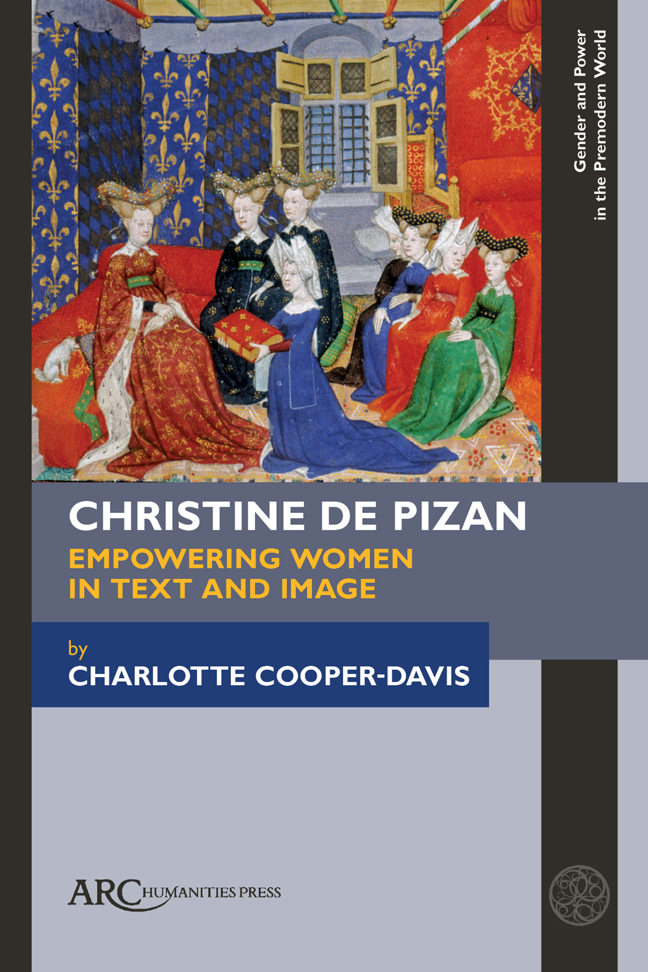Book contents
- Frontmatter
- Dedication
- Contents
- List of Illustrations
- Acknowledgements
- Abbreviations
- Note on Translation
- Introduction
- Chapter 1 Conventions, Collaboration, and Craft: Representing the Author in Christine de Pizan's Author-Manuscripts
- Chapter 2 Wisdom, Chastity, and War: The Power of Female Didactic Figures
- Chapter 3 Female Creation and Education in Le Livre de la mutacion de Fortune
- Chapter 4 Assessing the Gender of Christine's Audiences
- Conclusion
- Christine de Pizan's Illustrated Author-Manuscripts
- Bibliography
- Index
Chapter 4 - Assessing the Gender of Christine's Audiences
Published online by Cambridge University Press: 20 February 2024
- Frontmatter
- Dedication
- Contents
- List of Illustrations
- Acknowledgements
- Abbreviations
- Note on Translation
- Introduction
- Chapter 1 Conventions, Collaboration, and Craft: Representing the Author in Christine de Pizan's Author-Manuscripts
- Chapter 2 Wisdom, Chastity, and War: The Power of Female Didactic Figures
- Chapter 3 Female Creation and Education in Le Livre de la mutacion de Fortune
- Chapter 4 Assessing the Gender of Christine's Audiences
- Conclusion
- Christine de Pizan's Illustrated Author-Manuscripts
- Bibliography
- Index
Summary
Ma dame Raison, qui nottee
Diligemment et escoutee
L’ot, fu meue de grant pitié;
Si dit que pour son amistié
Encor verra s’on y peut mettre
Remede; et de ce entremettre
Moult voulentiers el se vouldroit,
Qu’on se gouvernast plus a droit.
(My Lady Reason, who had diligently
Listened to and understood the message,
Felt great pity;
Out of friendship, she said she would
See if any remedy might be found;
She was most willing and
Wished to mediate on this
So that all might govern more rightly.)
AROUND THE MID-POINT of the Chemin de lonc estude, a transition takes place in the narrative in which Cristine, who has been visiting the heavens guided by the Cumean Sibyl, reaches the end of her journey and the scene is set for a debate. As she makes her way through the highest point of the skies, Cristine enumerates the celestial figures she sees along the way, before entering into a detailed description of the four figures who occupy enthroned positions in the four corners of the sky: Sagece, Noblece, Chevalerie, and Richece (Wisdom, Nobility, Chivalry, and Wealth). Between these four ladies sits the most powerful of them all: Dame Raison (the scene is vividly envisioned in Figure 16). As Cristine enters the scene, a letter that has been delivered from Terre (Earth) is read to them by a messenger. In it, Terre begs for the ladies’ intercession in preventing mankind's greed, which has robbed her of her natural resources. Lady Reason reacts emotionally to the missive and promises to find a solution, a passage that is quoted in the above epigraph. The question of how to help Terre, which has been the subject of the letter, goes on to be debated by the four ladies, after which Cristine is tasked with bringing a summary of their arguments to the Court of France for its members to address Terre's concerns.
From this summary, the desired real-world applicability of the topics discussed in Christine's narrative are apparent, as the questions over which the characters debate over the course of some 3,600 lines are explicitly brought out of the celestial arena and transmitted to real personages for them to act upon – even if that action is only to continue the discussion. From this perspective, the line “Qu’on se gouvernast plus a droit” takes on a peremptory tone, inciting the reader to immediately apply some of what has beendiscussed to be conducive to better government.
- Type
- Chapter
- Information
- Christine de Pizan , pp. 109 - 132Publisher: Amsterdam University PressPrint publication year: 2023

